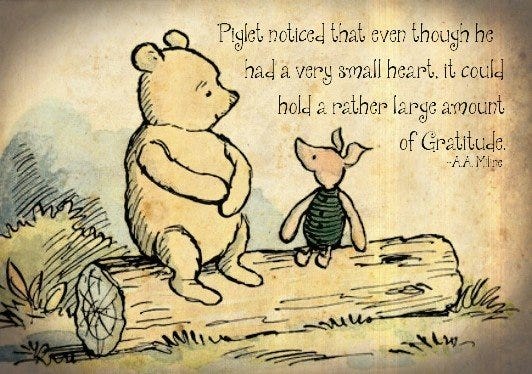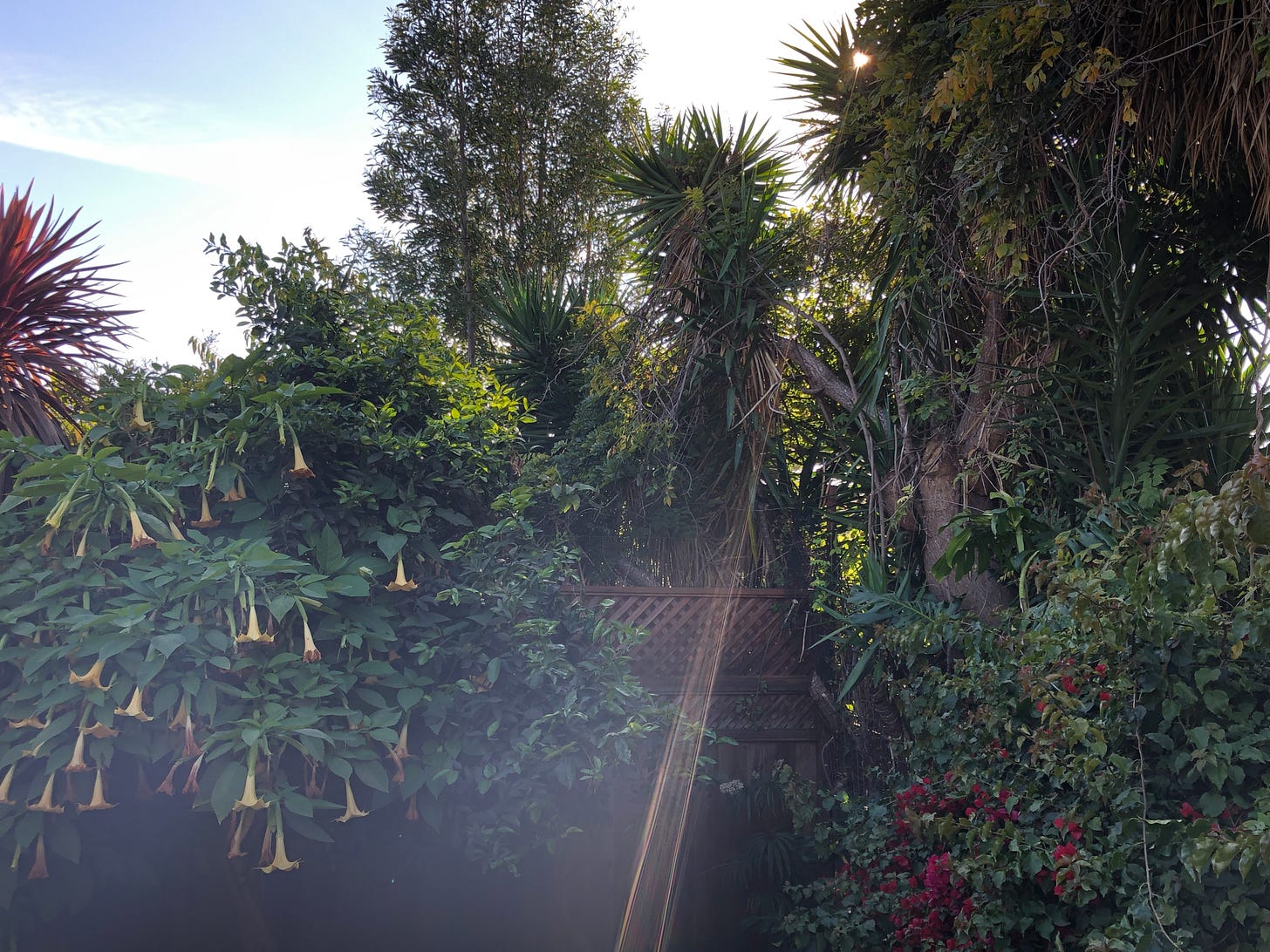When Gratitude Goes Wrong
It's that time of year again ...
“I am grateful for what I am and have. My thanksgiving is perpetual.”
— Henry David Thoreau
Thanksgiving is approaching in the U.S., with all its controversy, contradictions, and outright lies. Whether you love the festivities, experience it as a National Day of Mourning, or feel something in between or all of the above, one thing about this time is hard to escape. No, I’m not talking about sweaters or pumpkin spice. I’m referring to the focus on gratitude.
Not surprising for a day that’s purportedly about giving thanks. But gratitude has started to seem like a commodity, or the latest fad — one that we’d better all jump on. Gratitude, especially at Thanksgiving, is not just featured; it’s expected. There’s pressure to be grateful.
The thing is, gratitude can’t be forced.
Yes, gratitude has many benefits
To be clear, I’m a big proponent of gratitude — and even of a gratitude practice. Just ask Rafael. On many a night as we sit in the hot tub, I’ve encouraged each of us to list three things we’re grateful for that day. And yes, having a hot tub is one of them! And a house! And so much more!
Practicing gratitude is said to bring a slew of benefits, such as boosting self-esteem, making us happier, and even improving physical health. Numerous studies back up these claims.
Not that we really need studies to know that expressing gratitude feels good and improves our outlook. It serves as a reminder of what’s going well. When I find myself wishing for something I don’t have, reminding myself of what I do have puts me in a better frame of mind. I know I have it better than so, so many people in the world, in so, so many ways.
That’s true even when life is hard — and life is hard for everyone in some way or another. In list-loving Buddhism, the first Noble Truth is the truth of suffering. All life contains suffering, even the lives of the wealthiest, most powerful people. This doesn’t mean that life is only suffering or that we should wallow in suffering — far from it. Buddhism also shows the path to end suffering.
But that path does not include denying suffering. Paramount in Buddhism is seeing things as they are. Denying the bad stuff doesn’t magically make it go away.
Even gratitude has a dark side
Expressing gratitude just because we’ve been told to, rather than because we’re feeling it, can actually have negative effects. That’s the dark side of gratitude.
“What?!” I hear you exclaim. “There’s a dark side?”
Well, most things have a dark side, even if it isn’t always obvious. Here’s how gratitude can get dark.
Focusing on gratitude to suppress or avoid uncomfortable emotions
Even when we’re feeling down, we may be able to access feelings of gratitude. You might feel grateful for something as small as a ray of sunshine or something as large as a loved one’s recovery from a serious illness. It’s great to (gently) draw your mind to those things.
But if you use gratitude to minimize your negative feelings and don’t allow yourself to move through them, that denial is likely to make them grow. Remember what happened to George’s friend Lloyd Braun on Seinfeld! (“Serenity now; insanity later.”)
Forcing gratitude when you’re just not able to feel it can actually compound your negative feelings. Given the pressure to be grateful, the inability to muster up the feeling can make you feel worse about yourself — especially if you objectively have a lot to be grateful for.
This is true for all of us but especially for anyone experiencing serious depression. And in our current uncertain and “unprecedented” times, we’re all at least a bit stressed.
Focusing on the individual when it’s the system that needs changing
An insidious aspect of what some call the “self-help industrial complex” is that it can divert attention from actual problems we should be addressing.
Johann Hari, author of Stolen Focus, points out that "at its worst … self-help is training people to individually adjust to unacceptable, morally unjust social systems.” It’s great to work on ourselves, but we should also be working to adjust or even dismantle those systems.
Gratitude is as prone to this pitfall as any other trend in self-help.
I could write a lot more about individual responsibility versus systemic fixes, and I almost certainly will in future posts. This dilemma applies to so much in our world.
Sticking to gratitude for now, a corollary of this type of gratitude gone wrong is feeling gratitude toward abusers or oppressors. Should a slave feel grateful to a benevolent slave owner? Should an Amazon employee feel grateful for a small pay raise when Jeff Bezos, one of the richest people in the world, earns over $1.5 million a year?
They’d have a lot more to be grateful for if we fixed those oppressive systems. Sure, even rich people suffer in life — but changing the system could help a lot more people suffer a lot less.
Finding balance
As I finish writing this in our little backyard haven (aka the “R&R Spa,” named after me and Rafael), with the last rays of the low afternoon light peeking through the leaves of the yucca trees, I feel truly grateful just to be sitting here. I’m doing something I love in a beautiful setting. And sitting outside comfortably in November!
There’s a lot of value in stopping to appreciate small, everyday moments like this. And in letting yourself feel the hard stuff, too.
Back in early 2000, my best friend was dying at the same time that I was ending a relationship. Yeah, I have great timing. Mary Grace died on February 29, and that spring I attended a week-long silent retreat at Spirit Rock Meditation Center. I spent a lot of it crying. Then something strange happened. For a few months, I felt able to truly grieve while also experiencing more joy than usual. I don’t remember the details, but the memory of that unusual juxtaposition has remained with me.
It’s not an easy state to summon up, but I invite you to join me in trying to hold all the feelings at once. Maybe you can’t do that, or maybe you can’t feel gratitude at some given moment. Maybe those around you aren’t feeling appropriately grateful. When all else fails, aim for compassion — for them and for yourself.
And remember, gratitude isn’t reserved for Thanksgiving. It’s available any time of the year, whenever you’re ready for it.






What a wonderful article Rosana. We should all be grateful everyday, even for the small things in life that we take for granted; like waking up every morning and being able to enjoy our lives.
" And remember, gratitude isn’t reserved for Thanksgiving. It’s available any time of the year, whenever you’re ready for it."
Thank you!"